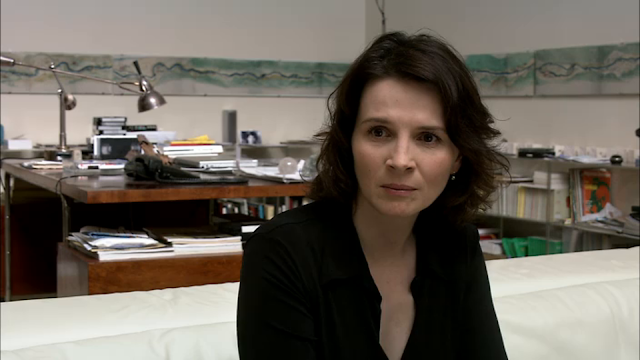Cache
I kept noticing all the videotapes and books on the shelves. The Laurents are an affluent, literate couple in Paris. Georges (Daniel Auteuil) hosts an interview show on public television; Anne (Juliette Binoche) is a publisher. Are the respective collections indicative of their owners? This is one of the many nagging thoughts I entertained during 2005's CACHE, writer/director Michael Haneke's coldly disturbing film in which these characters are harassed by deliveries of other videotapes, ones which are recordings of the front of their house.
On a later tape, there's the view of a different house. The one in which Georges grew up. Who would do such a thing? Is someone playing a prank? Is this the work of one of their son Pierrot's (Lester Makedonsky) school mates? The implications of the tapes create great discord in the household. They bring much to the surface, things perhaps present all along. Anne confronts her husband when he refuses to say who he thinks a likely suspect may be. Even worse, when Georges ends up on one of those tapes himself. I won't say more. But the title (translation: HIDDEN) is apt for each character.
CACHE considers memories, gradually expanding memories. Suppressed memories. Denial. Guilt. Secrecy. In the micro and macro. Familiarity with French history, specifically the Alegerian conflict, will elucidate Haneke's themes. His style is necessarily static, mimicking the content on those tapes. Its stillness makes the viewer increasingly anxious. The lack of movement and the enveloping quiet allow us to pay attention to possible clues, to watch the margins of the frame, particularly critical for that final scene.
The film can be taken as a mystery, and film buffs will see similarities to Hitchcock and even David Lynch at times. Haneke has his own m.o., and his film is none too concerned with who is sending those tapes. Even as we become sure who did it, we realize our focus is in vain. CACHE is a film to haunt your thoughts and dreams, to make your consider the sins of the individual and the collective. Maybe for the younger generations to learn from those errors. To ponder the depths of each character. There is a patently realistic dissection of married life here as well. The leads are just perfect. This is a good place to begin your Haneke education.



Comments